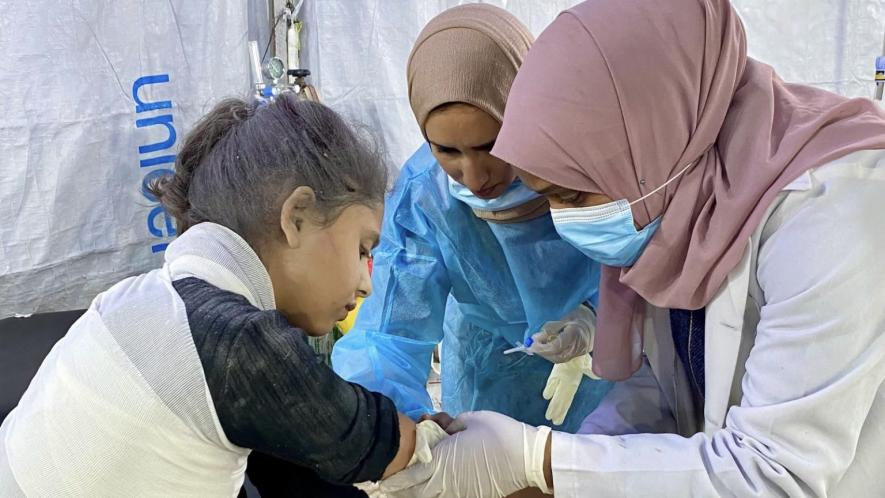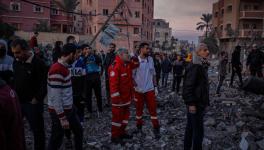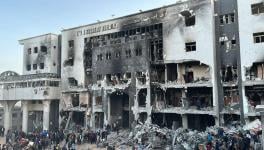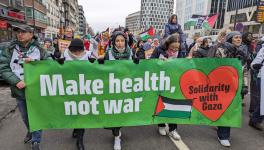Water Crisis Adds to Women’s Health Burden Amidst War on Gaza

Source: AWDA Health and Community Association
Over 34,000 people have been killed in Israeli attacks on the Gaza Strip since October 7, 2023. Among them are over 10,000 women, 6,000 of whom have left 19,000 orphaned children, according to a recent United Nations report. The health status and living conditions of women and girls in Gaza continue to plummet as no hygiene supplies are available, and infectious diseases pose a threat to them as caregivers within their families.
The water and sanitation crisis has left forcibly displaced women, along with other members of their families, surviving on as little as 1.5 liters of water per day, whereas the minimum prescribed for crisis situations is 15 liters per day. The effects are particularly harsh on pregnant women and those who are breastfeeding infants. According to the UN report, they need at least 7.5 liters of water per day to stay hydrated—not even considering the necessity of maintaining basic hygiene standards.
“We are already noticing an increase in women and children struggling with dehydration and diarrhea. Infants who have no access to breastfeeding—due to the inability or the death of a mother—and must use formula are especially vulnerable due to the need for clean, safe water, which is rarely available in Gaza at present,” a physician told the UN team.
Diarrhea is not the only disease spreading more easily due to the war. UN agencies have recorded increased numbers of illnesses such as Hepatitis A, as well as scabies and lice. Among women and girls, the combination of a lack of water and sanitary essentials, like menstrual pads, is likely to lead to an increase in reproductive and urinary tract infections. There is a need for approximately 10 million disposable sanitary pads to enter Gaza each month to ensure basic menstrual hygiene, but this number is nowhere near being met.
Instead, Israel’s blockades on humanitarian convoys are forcing women and girls to rely on makeshift sponges, tent scraps, and fabric strips during their periods. This comes not only with physical and reproductive health implications but also with mental health risks, as the lack of sanitation facilities and showers forces them to menstruate without any privacy.
Israel’s obstruction of humanitarian missions and convoys is also ensuring that not enough food reaches Gaza, exacerbating existing concerns about malnutrition and famine. Even the convoys that are allowed to enter the area, like the one coordinated by the World Food Program at the beginning of April and targeted by the Israeli Occupation Forces (IOF), are not given adequate security guarantees and remain exposed to attacks.
According to analyses published by the Bisan Center for Research and Development, if Palestinian civil protection agencies or volunteers try to accompany the convoys, they themselves are targeted by the Israeli army. “It is a systematic policy to obliterate and waste all the resources of the Palestinian people, which are crucial in helping them stand firm against the Israeli brutal onslaught,” Bisan’s report concludes.
The same is true for the destruction of Palestinian health infrastructure by the IOF. A recent World Health Organization (WHO) mission to Al-Shifa Hospital, once Gaza’s largest referral center, documented the extent of destruction inflicted on the hospital during the IOF’s latest attack. In a field report from Al-Shifa, Richard Peeperkorn, WHO representative for the occupied Palestinian territories, reflected on the possibility of transforming the ruins into a referral center once again. While the WHO remains committed to achieving this, the report states that a massive effort will be needed to make it happen.
As Al-Shifa currently lies in ruins, a massive clearing campaign will be necessary, followed by interventions from building, health, and water engineers, and the renewal of all the medical equipment that was destroyed by the IOF. According to Peeperkorn’s report, this can only be a long-term goal. In the short term, with significant resources allocated for basic clearing, the complex could function as a first-response point. However, even this will not be possible without a ceasefire and security guarantees for health missions entering Gaza.
People’s Health Dispatch is a fortnightly bulletin published by the People’s Health Movement and Peoples Dispatch. For more articles and to subscribe to People’s Health Dispatch, click here.
Get the latest reports & analysis with people's perspective on Protests, movements & deep analytical videos, discussions of the current affairs in your Telegram app. Subscribe to NewsClick's Telegram channel & get Real-Time updates on stories, as they get published on our website.
























